| Listing 1 - 7 of 7 |
Sort by
|
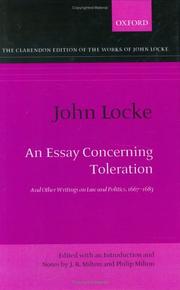
ISBN: 0198237219 9780199575732 9780198237211 Year: 2006 Publisher: Oxford: Clarendon,
Abstract | Keywords | Export | Availability | Bookmark
 Loading...
Loading...Choose an application
- Reference Manager
- EndNote
- RefWorks (Direct export to RefWorks)
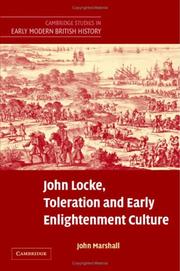
ISBN: 9780521651141 052165114X Year: 2006 Volume: *23 Publisher: Cambridge ; New York Cambridge University Press
Abstract | Keywords | Export | Availability | Bookmark
 Loading...
Loading...Choose an application
- Reference Manager
- EndNote
- RefWorks (Direct export to RefWorks)
History of civilization --- Locke, John --- Europe --- Enlightenment --- Lumières (Philosophie) --- Lumières [Siècle des ] --- Siècle des Lumières --- Verlichting (Filosofie) --- Religious tolerance --- Enlightenment. --- Tolérance religieuse --- Siècle des lumières --- History --- Histoire --- Locke, John, --- -Enlightenment. --- 172.3 --- 1 LOCKE, JOHN --- Aufklärung --- Eighteenth century --- Philosophy, Modern --- Rationalism --- Tolerance, Religious --- Toleration --- -Religie en staat. Gewetensvrijheid. Intolerantie. Tolerantie --- Filosofie. Psychologie--LOCKE, JOHN --- Philanthropus, --- Lokk, Dzhon, --- Lūk, Jūn, --- Lo-kʻo, --- Locke, Giovanni, --- Lock, --- Lock, John, --- Rokku, Jon, --- לוק, י׳ון, --- 1 LOCKE, JOHN Filosofie. Psychologie--LOCKE, JOHN --- 172.3 Religie en staat. Gewetensvrijheid. Intolerantie. Tolerantie --- Religie en staat. Gewetensvrijheid. Intolerantie. Tolerantie --- Tolérance religieuse --- Siècle des lumières --- 17th century
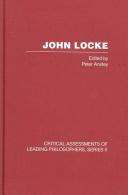
ISBN: 9780415350587 0415350581 0415350549 9780415350549 0415350557 9780415350556 0415350565 9780415350563 0415350573 9780415350570 Year: 2006 Publisher: London : Routledge,
Abstract | Keywords | Export | Availability | Bookmark
 Loading...
Loading...Choose an application
- Reference Manager
- EndNote
- RefWorks (Direct export to RefWorks)
Locke, John, --- Locke, John --- Contribution à la philosophie politique. --- Morale. --- Contribution à l'éducation. --- Religion. --- Philanthropus, --- Lokk, Dzhon, --- Lūk, Jūn, --- Lo-kʻo, --- Locke, Giovanni, --- Lock, --- Lock, John, --- Rokku, Jon, --- לוק, י׳ון,
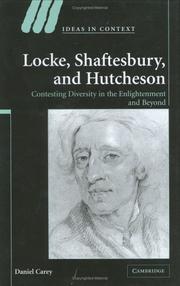
ISBN: 9780521845021 0521845025 9780511490453 9780521117463 0511137214 9780511137211 0511135041 9780511135040 0511490453 1107152046 9781107152045 1280422157 9781280422157 0511183488 9780511183485 0511201435 9780511201431 0511311656 9780511311659 0521117461 Year: 2006 Volume: 74 Publisher: Cambridge, UK New York Cambridge University Press
Abstract | Keywords | Export | Availability | Bookmark
 Loading...
Loading...Choose an application
- Reference Manager
- EndNote
- RefWorks (Direct export to RefWorks)
Daniel Carey examines afresh the fundamental debate within the Enlightenment about human diversity. Three central figures - Locke, Shaftesbury, and Hutcheson - questioned whether human nature was fragmented by diverse and incommensurable customs and beliefs or unified by shared moral and religious principles. Locke's critique of innate ideas initiated the argument, claiming that no consensus existed in the world about morality or God's existence. Testimony of human difference established this point. His position was disputed by the third Earl of Shaftesbury who reinstated a Stoic account of mankind as inspired by common ethical convictions and an impulse toward the divine. Hutcheson attempted a difficult synthesis of these two opposing figures, respecting Locke's critique while articulating a moral sense that structured human nature. Daniel Carey concludes with an investigation of the relationship between these arguments and contemporary theories, and shows that current conflicting positions reflect long-standing differences that first emerged during the Enlightenment.
General ethics --- Locke, John --- Hutcheson, Francis --- Shaftesbury, of, Anthony A.C. --- Benefices [Ecclesiastical] --- Beneficies [Kerkelijke ] --- Bénéfices ecclésiastiques --- Church benefices --- Enlightenment --- Graces [Expectative] --- Lumières (Philosophie) --- Lumières [Siècle des ] --- Pluralism (Benefices) --- Siècle des Lumières --- Verlichting (Filosofie) --- Enlightenment. --- Pluralism. --- Locke, John, --- Shaftesbury, Anthony Ashley Cooper, --- Hutcheson, Francis, --- Pluralism --- Monadology --- Monism --- Philosophy --- Reality --- Aufklärung --- Eighteenth century --- Philosophy, Modern --- Rationalism --- Anthony, --- Cooper, Anthony Ashley, --- Shaftsbury, Anthony Ashley Cooper, --- Sheftsberi, Ėntoni Ėshli Kuper, --- Shaftesbury, Anthony Ashley Cooper --- Philanthropus, --- Lokk, Dzhon, --- Lūk, Jūn, --- Lo-kʻo, --- Locke, Giovanni, --- Lock, --- Lock, John, --- Rokku, Jon, --- לוק, י׳ון, --- Arts and Humanities --- History
Book
ISBN: 2745313320 9782745313324 Year: 2006 Volume: 12 Publisher: Paris: Honoré Champion éditeur,
Abstract | Keywords | Export | Availability | Bookmark
 Loading...
Loading...Choose an application
- Reference Manager
- EndNote
- RefWorks (Direct export to RefWorks)
Le XVIIIe siècle postule un progrès des connaissances humaines, mais il entend aussi recueillir les monuments du passé, en instaurant un nouveau classement des savoirs. Une première section montre comment se constitue une mémoire culturelle à l'époque des Lumières et plus particulièrement dans les années de l'Ancien Régime. Plus largement, sont abordés les grandes questions épistémologiques, et les nouvelles représentations du temps et de l'histoire. Les figures de la philosophie, Montesquieu, Voltaire, Diderot, Rousseau, des écrivains comme Prévost et Bernardin de Saint-Pierre, des dramaturges comme Marie-Joseph Chénier, font ensuite l'objet d'analyses spécifiques. Une troisième partie évoque, souvent avec humour, la gastronomie, le libertinage et l'érotisme dont l'époque fut si friande. Enfin le voyage, la déambulation, le rêve et l'imaginaire, sont étudiés par les historiens des sensibilités qui nous réservent à cet égard de surprenantes découvertes. Ce volume a été constitué en hommage à Jean Goulemot, professeur honoraire de l'Université de Tours, spécialiste éminent du XVIIIe siècle, dont les travaux portent tout particulièrement sur la conception de l'histoire au XVIIIe siècle et lui ont acquis une renommée internationale.
Enlightenment --- Siècle des Lumières --- France --- Intellectual life --- History --- Vie intellectuelle --- Histoire --- Drama --- History and criticism. --- Siècle des Lumières --- Drama - 18th century - History and criticism. --- LOCKE (JOHN), PHILOSOPHE ANGLAIS, 1632-1704 --- VOLTAIRE, 1694-1778 --- ENCYCLOPEDIE (DIDEROT-D'ALEMBERT) --- ROUSSEAU (JEAN-JACQUES), 1712-1778 --- SAINT-SIMON (CLAUDE HENRI DE ROUVROY, 1760-1825, COMTE DE) --- MONTESQUIEU (CHARLES DE SECONDAT, BARON DE LA BREDE ET DE), 1689-1755 --- DIDEROT, DENIS (1713-1784) --- BERNARDIN DE SAINT-PIERRE (JACQUES HENRI), 1737-1814 --- CHENIER, ANDRE (1762-1794) --- Mémoire collective --- Imaginaire --- Historiographie --- CRITIQUE ET INTERPRETATION --- XVIIIe siècle
Book
ISBN: 9020967436 9789020967432 Year: 2006 Publisher: Leuven LannooCampus
Abstract | Keywords | Export | Availability | Bookmark
 Loading...
Loading...Choose an application
- Reference Manager
- EndNote
- RefWorks (Direct export to RefWorks)
11 --- Academic collection --- #SBIB:1H10 --- 11 Metafysica --- Metafysica --- Filosofie: inleidingen en algemene overzichten --- 152 --- Berlin Isaiah --- Derrida Jacques --- Hegel Georg W.F. --- Heraclitus --- Hume David --- Husserl Edmund --- Kierkegaard Soren --- Kuhn Thomas --- Popper Karl --- Sartre Jean-Paul --- Taylor Charles --- Thomas Van Aquino --- Weber Max --- Wiener Kreis --- Willem van Ockham --- Wittgenstein Ludwig --- deconstructie --- natuurfilosofen --- sofisten --- filosofie - inleidingen --- Aristoteles --- Augustinus --- Descartes René --- Freud Sigmund --- Heidegger Martin --- Kant Immanuel --- Lacan Jacques --- Locke John --- Marx Karl --- Merleau-Ponty Maurice --- Nietzsche Friedrich --- Parmenides --- Plato --- Socrates --- Spinoza --- ethiek --- fenomenologie --- filosofie --- geschiedenis --- postmodernisme --- Philosophy --- Hegel Georg W.F --- 11 Metaphysics --- Metaphysics
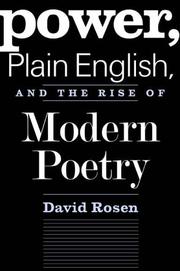
ISBN: 030010071X 9786611730291 1281730297 0300129483 9780300129489 9780300100716 9781281730299 Year: 2006 Publisher: New Haven Yale University Press
Abstract | Keywords | Export | Availability | Bookmark
 Loading...
Loading...Choose an application
- Reference Manager
- EndNote
- RefWorks (Direct export to RefWorks)
In this engaging book David Rosen offers a radically new account of Modern poetry and revises our understanding of its relation to Romanticism. British poets from Wordsworth to Auden attempted to present themselves simultaneously as persons of power and as moral voices in their communities. The modern lyric derives its characteristic complexities-psychological, ethical, formal-from the extraordinary difficulty of this effort.The low register of our language-a register of short, concrete, native words arranged in simple syntax-is deeply implicated in this story. Rosen shows how the peculiar reputation of "plain English" for truthfulness is employed by Modern poets to conceal the rift between their (probably irreconcilable) ambitions for themselves. With a deep appreciation for poetic accomplishment and a wonderful iconoclasm, Rosen sheds new light on the innovative as well as the self-deceptive aspects of Modern poetry. This book alters our understanding of the history of poetry in the English language.
820-1 "18" --- 820-1 "19" --- 820-1 "19" Engelse literatuur: poëzie--20e eeuw. Periode 1900-1999 --- Engelse literatuur: poëzie--20e eeuw. Periode 1900-1999 --- 820-1 "18" Engelse literatuur: poëzie--19e eeuw. Periode 1800-1899 --- Engelse literatuur: poëzie--19e eeuw. Periode 1800-1899 --- English language --- English poetry --- English literature --- Style --- History and criticism --- Metrics and rhythmics --- Rhetoric --- Auden, W. H. --- Eliot, T. S. --- Locke, John, --- Wordsworth, William, --- Yeats, W. B. --- Ai-lüeh-tʻe, --- Eliot, Thomas Stearns, --- Īliyūt, T. S., --- Elliŏtʻŭ, --- Eliot, Thōmas S., --- Eliot, Th. S., --- Eliot, Thomas Stern, --- Elyoṭ, T. S., --- Ėliot, Tomas Stirns, --- אליוט ט.ס --- אליוט, ת. ס. --- Oden, U., --- Auden, Wystan Hugh, --- D. E. D. I., --- Daemon Est Deus Inversus, --- Ganconagh, --- I., D. E. D., --- Ĭeĭts, U. B. --- Ĭeĭts, Uilʹi︠a︡m Batler, --- Weilian Batele Yezhi, --- Yeats, William Butler, --- Yeṭs, Ṿilyam Baṭler, --- יטס, יטלאם בטלר --- ייטס, ויליאם בטלר, --- 威廉,巴特勒,叶芝, --- Wœ̄tsawœ̄t, Winlīam, --- Wurdzwurth, Wilyam, --- Varḍsavartha Viliyama, --- Axiologus, --- Criticism and interpretation. --- Influence. --- Eliot, Thomas Stearns --- Locke, John --- Criticism and interpretation --- Yeats, William Butler --- Auden, Wystan Hugh --- Wordsworth, William --- Influence --- 20th century --- 19th century --- Йейтс, У. Б. --- Йейтс, Уильям Батлер, --- History and criticism. --- Style. --- Philanthropus, --- Lokk, Dzhon, --- Lūk, Jūn, --- Lo-kʻo, --- Locke, Giovanni, --- Lock, --- Lock, John, --- Rokku, Jon, --- לוק, י׳ון, --- Germanic languages
| Listing 1 - 7 of 7 |
Sort by
|

 Search
Search Feedback
Feedback About UniCat
About UniCat  Help
Help News
News